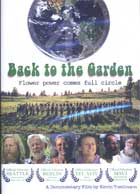
Back to the Garden 2011
Distributed by Heaven Scent Films
Produced by Kevin Tomlinson & Judy Kaplan
Directed by Kevin Tomlinson
DVD, color, 70 & 58 mins.
Sr. High – General Adult
American Studies, Aging, Counter-culture, Popular Culture
Date Entered: 11/28/2011
Reviewed by Justin Cronise, D'Youville College, Buffalo, NY and Genesee Community College, Batavia, NYBack to the Garden is a lighthearted yet compelling documentary that takes a poignant look into the lives of individuals on the fringe of society, and at the evolution of a counter-culture movement. With beautiful footage and interviews from a back-to-the-land gathering in 1988, filmmaker Kevin Tomlinson catches up with the same individuals twenty years later. These individuals discuss their lives, their beliefs and personal philosophies, and how they have changed since 1988. There are elements of informing and persuading, but mostly this is a loving homage to these individuals who wanted to reconnect with others and the Earth in a more meaningful way, and valued nature, peace, and love above all.
This film presents the flower power idealism so closely associated with the hippie movement in the US in the 1960s and 1970s; however, it is presented as a set of positive values that are at least as relevant in today’s world, rather than the negative connotations that have been presented by mainstream culture for decades. Even in 1988, the “Healing Gathering” event was considered a revival of hippie culture, yet these values seem especially relevant in the context of contemporary events such as the economic downturn caused by the financial market meltdown, continued engagement of the US in wars and violent conflicts abroad, and in the emergence of social movements such as “Occupy Wall Street,” the hipness of “green” business practices, the organic food movement, the revived (or continuing) back-to-the-land movement, and the rise of grassroots-oriented political parties.
What is important about Back to the Garden is that it shows an alternative way of thinking and living that is beautiful and satisfying, without being a part of the money-driven mainstream American (and for the most part, global) system. More young people are attending higher education than ever before, but they will likely generate massive student loan debts before they even know what they want to do with their lives, obligating them willingly or unwillingly to join the conventional workforce to earn the money to pay off their debts. The individuals in Back to the Garden may not have ever had much money, but they live sustainably with their gardens and the support of their community, and could be considered to live with more freedoms by being free from money. The film also provides interesting insights into the topic of aging in alternative communities and how personal philosophies may change over time. For the most part, these elder flower children have stayed true to their principles of peace and love.
The DVD includes a 70-minute theatrical version as well as a 58-minute broadcast version that is largely identical. Overall, the film is visually appealing, in large part due to the scenic views of rural Washington State, and there are many beautiful scenes. Many of the interviews are well-done, but there are occasions when they seem over-edited or the vocals are cut off. However, viewers can always tell that the filmmaker lovingly conducted the interviews and compiled all of the content, which makes the film enjoyable to watch.
This film may be sweetly nostalgic for older audiences who fondly remember their hippie youth, and enlightening for today’s receptive youths. Back to the Garden is recommended for general audiences and public libraries, as well as potentially useful in an educational setting for mature school-age and college-age audiences studying alternative lifestyles, counter-cultures, American cultural movements, and aging (Note: some nudity and a discussion of marijuana).